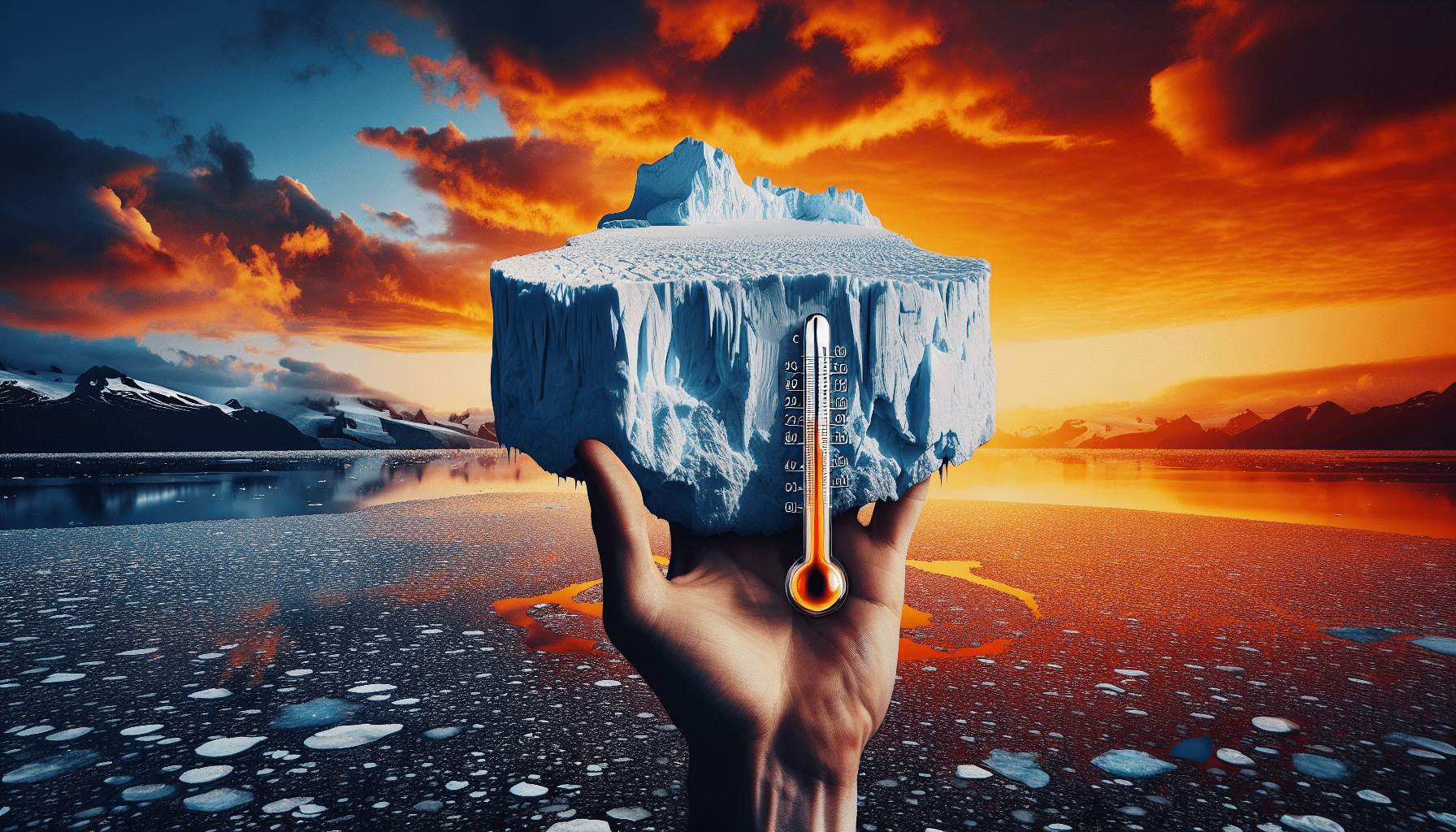In the fascinating realm of climate change, there exists a group of individuals who challenge the widely accepted scientific consensus. These climate change deniers are eager to voice their skepticism, challenging the evidence and questioning the urgency for action. But what lies behind their arguments? In this article, we explore the world of climate change deniers, uncovering their rhetoric and motivations, in an effort to understand their perspective. From claims of natural climate variability to mistrust of scientific institutions, we delve into the reasons behind their dissenting voice. Join us as we navigate this complex landscape, seeking to shed light on the skepticism that persists amidst the pressing issue of climate change.
Argument 1: Natural Climate Variation
Climate has always changed naturally
One of the key arguments put forth by climate change deniers is that climate has always experienced natural changes over time. They argue that throughout Earth’s history, there have been periods of both warming and cooling, long before human activity significantly contributed to greenhouse gas emissions. By highlighting the existence of natural climate variation, deniers suggest that the current warming trend is part of a natural cycle and not solely influenced by human activity.
Current warming is part of a natural cycle
Deniers contend that the current warming trend is simply a continuation of natural climate cycles that have occurred throughout history. They argue that attributing the current warming solely to human activity neglects the role of natural factors, such as solar variability and volcanic eruptions, which have historically influenced the Earth’s climate. Advocates of this argument emphasize the need to recognize and understand natural climate variations before jumping to conclusions about human-induced global warming.
Argument 2: Inaccurate Data
Climate models are flawed
Another point raised by climate change deniers is the alleged flaws within climate models. They argue that these models, used to project future climate scenarios, are based on assumptions and simplifications that may not accurately represent the complexity of the Earth’s climate system. Deniers claim that these models cannot account for all the variables involved in climate processes, and therefore, their predictions should be treated with skepticism.
Temperature records are unreliable
Climate change deniers also question the reliability of temperature records used to analyze long-term climate trends. They argue that temperature measurements, particularly from older periods, may be influenced by factors such as changes in land use, urban heat island effects, and the placement of weather stations. Deniers contend that these factors can introduce biases into the data, casting doubt on the accuracy of temperature records and subsequently challenging the claim of significant anthropogenic warming.
Argument 3: Insufficient Evidence
Not enough evidence to prove human-caused climate change
Skeptics of human-caused climate change often assert that there is not enough evidence to definitively link greenhouse gas emissions to global warming. They advocate for a more cautious approach, asserting that correlation does not imply causation. Deniers claim that while there is evidence of rising temperatures, it is insufficient to confirm that human activity is solely responsible for this change. They urge the scientific community and policymakers to exercise greater skepticism when drawing conclusions about the cause of climate change.
Different interpretations of climate data
In addition to questioning the existence of sufficient evidence, climate change deniers also highlight the various interpretations of climate data within the scientific community. They argue that disagreement among experts regarding the significance of specific trends or the influence of distinct factors undermines the consensus on human-caused climate change. Deniers often point to discrepancies in scientific studies and conflicting theories as evidence that the understanding of climate change is far from settled.
Argument 4: Political Agenda
Climate change used as an excuse for political control
Climate change deniers frequently claim that the issue of climate change is being exploited as a means of political control. They argue that politicians and activists leverage climate change to justify intrusive policies and regulations that restrict personal freedoms and expand government control. Deniers assert that pushing a climate change agenda allows governments to regulate industries, control energy production, and allocate resources, thereby exerting authority over individuals and impeding economic growth.
Fearmongering for funding purposes
Deniers often contend that the urgency surrounding climate change is exaggerated to secure funding for scientific research and environmental organizations. They argue that fearmongering about catastrophic consequences, such as rising sea levels and extreme weather events, is used to generate public concern and secure financial support. Deniers claim that this focus on potential catastrophes overlooks the potential benefits of a changing climate and hinders rational discussions about the cost-effectiveness of mitigation strategies.
Argument 5: Uncertain Future Projections
Future predictions are uncertain
One of the key arguments challenging the consensus on climate change revolves around the uncertainty of future climate projections. Climate change deniers argue that while scientists may have a good understanding of past and current climate conditions, predicting future climate scenarios accurately is far more challenging. They emphasize that the Earth’s climate system is incredibly complex, affected by numerous feedback loops and nonlinear processes, making it difficult to create accurate models that can reliably predict future climatic changes.
Climate models cannot accurately predict the future
Deniers often criticize climate models for their failure to accurately predict past climate changes and extreme weather events. They argue that if these models struggle to reproduce historical climate data, their ability to forecast the future is questionable at best. Deniers assert that reliance on imperfect models and uncertain predictions should not form the basis for shaping policies aimed at combating climate change, advocating for a more cautious and measured approach to decision-making.
Argument 6: Natural Causes Dominant
Natural causes outweigh human influence on climate
Climate change skeptics frequently emphasize the influence of natural causes on the Earth’s climate, downplaying the significance of human activities. They argue that factors such as solar radiation, volcanic activity, and natural climate cycles have historically played more significant roles in determining global temperatures than human-induced greenhouse gas emissions. Deniers contend that attributing the majority of climate change solely to humans disregards the inherent variability and adaptability of the Earth’s climate system.
Disregard for human impact
In line with the argument that natural causes dominate climate change, skeptics often accuse proponents of neglecting the positive impacts of human activities on the environment. They argue that focusing solely on the negative aspects and potential risks associated with climate change overlooks the significant advancements made in reducing pollution, increasing energy efficiency, and promoting sustainable practices. Deniers advocate for a more balanced perspective that acknowledges both the potential risks and benefits of human activities on the climate.
Argument 7: Economic Consequences
Costly policies to mitigate climate change
Climate change skeptics often argue against implementing costly policies aimed at mitigating climate change. They contend that the proposed measures, such as carbon taxes, renewable energy subsidies, and stringent emissions regulations, impose significant financial burdens on industries and individuals. Deniers emphasize the potential negative consequences of such measures on economic growth, personal wealth, and job opportunities. They advocate for pursuing less financially burdensome solutions that do not hamper economic progress.
Negative impact on the economy
In addition to the cost of mitigation policies, climate change skeptics frequently raise concerns about the potential negative impact on the economy. They argue that certain industries and regions heavily rely on fossil fuels and emissions-intensive activities for economic growth and job creation. Deniers express apprehension that transitioning away from these industries to achieve emission reduction targets would lead to job losses and economic downturns, particularly in communities dependent on fossil fuel extraction and production.
Argument 8: Conspiracy Theories
Climate change is a hoax
One of the more extreme arguments put forth by climate change deniers is the assertion that the entire climate change phenomenon is a deliberate hoax. They claim that the scientific consensus on climate change is manipulated and fueled by political motivations rather than empirical evidence. Deniers suggest that proponents of climate change are part of a vast conspiracy seeking to control global policy agendas and manipulate public opinion for their own gain.
Manipulation of data by scientists
Deniers frequently accuse scientists of manipulating climate data to support predetermined conclusions about human-caused climate change. They argue that certain scientists cherry-pick data, apply incorrect statistical methods, and manipulate temperature records to exaggerate the warming trend and its association with greenhouse gas emissions. Deniers contend that this alleged manipulation skews the perception of climate change and questions the credibility of climate science as a whole.
Argument 9: Lack of Consensus
Scientific community is divided on climate change
Climate change skeptics highlight disagreement and lack of consensus within the scientific community as evidence that the issue is far from settled. They argue that there are reputable scientists who question the extent of human influence on climate change or challenge the methods used to attribute specific climate events to anthropogenic causes. By presenting dissenting voices within the scientific community, deniers aim to cast doubt on the widely accepted consensus that human activities are the primary drivers of global warming.
Disagreements among experts
In addition to the lack of consensus within the scientific community, climate change skeptics emphasize the disagreements among experts regarding the most effective strategies for mitigating climate change. Deniers argue that differing opinions about the magnitude of the problem, appropriate responses, and the role of technology and innovation further highlight uncertainty in the field. They claim that this lack of agreement among experts undermines the credibility of climate change science and justifies a cautious approach to policy-making.
Argument 10: Technological Solutions
Focus on technological advancements to combat climate change
Climate change deniers often advocate for a greater emphasis on technological advancements as a more viable solution to the challenges posed by climate change. They contend that investing in research and development of renewable energy sources, carbon capture technology, and sustainable practices will yield more effective and economically viable solutions in the long run. Deniers argue that focusing on innovation and technological progress, rather than burdensome regulations, will not only address climate change but also provide economic opportunities and benefit society as a whole.
Belief that innovation can solve any resulting problems
In line with the focus on technological solutions, deniers express confidence in humanity’s ability to overcome any challenges resulting from climate change. They argue that throughout history, innovation and adaptability have allowed societies to overcome various environmental and societal challenges. Deniers believe that similar solutions will arise as new technologies emerge, enabling society to mitigate the impacts of climate change without the need for drastic policy interventions or global agreements. They advocate for maintaining faith in human ingenuity and entrepreneurial spirit to address climate change effectively.
In conclusion, climate change deniers put forth various arguments to challenge the consensus on anthropogenic global warming. These arguments range from emphasizing natural climate variation, questioning the accuracy of climate data, and asserting insufficient evidence to casting doubt on the motivations behind addressing climate change. Deniers highlight the uncertain nature of future projections, the dominance of natural causes, and the potential economic consequences of mitigation policies. They also raise conspiracy theories and point out the lack of consensus within the scientific community as reasons to question the prevailing narrative. Finally, deniers propose a greater focus on technological advancements as the key to addressing climate change, placing their faith in human innovation and resilience. While these arguments may sow doubt within the climate change discourse, the overwhelming body of scientific evidence supports the conclusion that human activities are indeed impacting the Earth’s climate.




